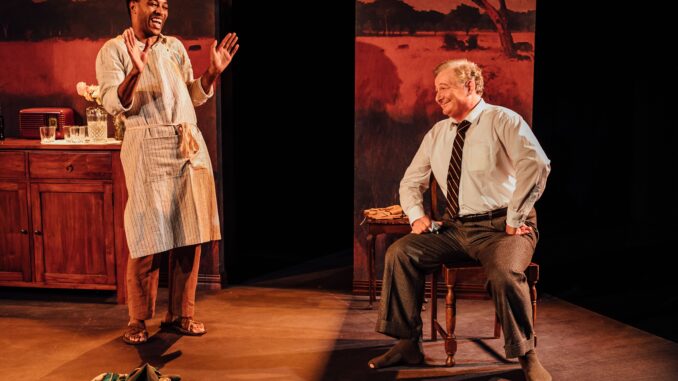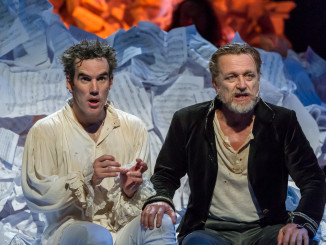
[Unearthing the realities of Anti-Black Racism]
Black Lover is a tale about colonial violence during the mid-1960s prelude to Zimbabwe’s fight for independence, sparked by increasing resistance to rule by a White-only minority. Written by Stanley Makuwe, it follows the fever-ridden agitation of Rhodesia’s former colonial leader, Garfield Todd (Cameron Rhodes), who is trapped at home due to a house arrest order issued by the incumbent leader Ian Smith. The play traces his experience of confinement, and how much it differs from the sub-human status accorded to his cook and servant, introduced to the audience as ‘Steady’ (Simbarashe Matshe).
Between hailstorms of bullets firing in the distance, the play focuses on the human frailty of seeking out psychological refuge in the company of other human beings. Mr Todd consistently speaks from a place of wanting equal access to opportunity for everyone in Zimbabwe, failing to recognise the systematic deprivation of those rights imposed upon the Black majority of the country’s population even when called out on the structure of law enforcement institutions. For his part, ‘Steady’ speaks of the everyday uncertainty of not knowing which day he will find his life eliminated by an officer representing the ‘law of the land’, highlighting the alarming state of inequality being perpetuated as the foundation of a system deliberately designed to impoverish the colonised while simultaneously enriching the coloniser. Rachael Walker’s set serves as a composite representation of this dichotomy, almost appearing as a silent third character observing the sharing of humanity being exchanged by the two leads as danger creeps closer with each passing half hour.
The pivotal scene in the play brings the audience the delight of watching ‘Steady’ play the queen of the colonial state in faraway London, commanding respect and obedience from the former leader of her government. Suffused with humour and wit, this exchange between Mr Todd and ‘Steady’ probes at the straining justifications for the continuation of colonial rule in ‘Rhodesia’. We see Mr Todd disavow his own sovereign upon discovering that ‘Steady’ guesses correctly, that her own will means very little in an institution designed to perpetuate inequality across the world. This fleeting moment of levity is cut short by another storm of bullets we hear flying past the windows, causing both characters to find themselves crouching on the ground to defend their lives on a level playing field.
Matshe’s energised performance is matched by the understated and optimistic portrayal by Rhodes, making for an engrossing performance that never loses the audience’s attention from beginning to end. This is the actors’ second run with these characters – a journey that began with the Auckland Arts Festival in early 2020. Roy Ward’s direction succeeds in building up anticipation for the climax. The play conveys the sheer terror of living amidst the decline of Britain’s glory decades as the world’s most victorious bully. At the same time, the gravity of the mood is interrupted by the ambivalence of the story’s conclusion. I would’ve liked to see more of Mr Todd’s reactions to anecdotes of violence experienced firsthand by the Black population to render more dimensions to the relationship between the two men.
I am left feeling dissatisfied with the as-is presentation of the brutality of colonial violence against the easily sunburned, because it felt like it numbed the shock of Pākehā audiences, who were recently reminded that racism still exists in the twenty-first century as the Black Lives Matter movement gathered steam in the USA. The moment that Makuwe’s script shines brightest is when ‘Steady’ loses his temper, revealing the extent of trauma that colonisation has bequeathed to him by raging to his employer about the erasure of his own name, Ingwe, and how he was given no choice in this to uphold colonial convenience. The story doubles down on the stark presentation of the devastation of Zimbabwean culture by emphasising how much importance colonised peoples place on their children learning English to be able to attain positions of power and privilege in colonial – and postcolonial – societies. This resonates with me since it bares the reality of cultural erasure that is little-known in Pākehā communities, and will likely resonate with many non-Pākehā audience members for similar reasons.
Black Lover is, at its core, a response to the idea of a white man being the saviour of the world – one that forms the bedrock of the ‘civilising mission’ of colonisation. The ending of the play does not bring closure to the idea that this might have been dislodged in either of the protagonists’ minds, accurately imitating the slow process of changing another human being’s mind when it comes to longstanding value conditioning that comes with being raised in isolation with ‘your own kind’ in colonial societies. The performance succeeds at placing this conditioning under the microscope for closer inspection, but this doesn’t have the intended impact of rousing the audience from the complacent state of craving comfort over the recognition of trauma inflicted upon so many scattered nations across the world through colonially-imposed racism.
Black Lover plays 9-13 September 2020 as part of Auckland Theatre Company’s Back on the Boards mini-festival.
SEE ALSO: Anuja Mitra’s review of the debut Auckland Arts Festival production of Black Lover and Nik Smythe for Theatreview.




Leave a Reply